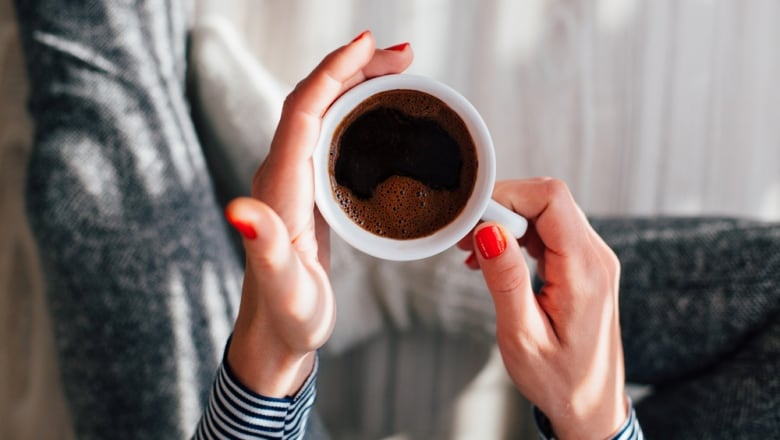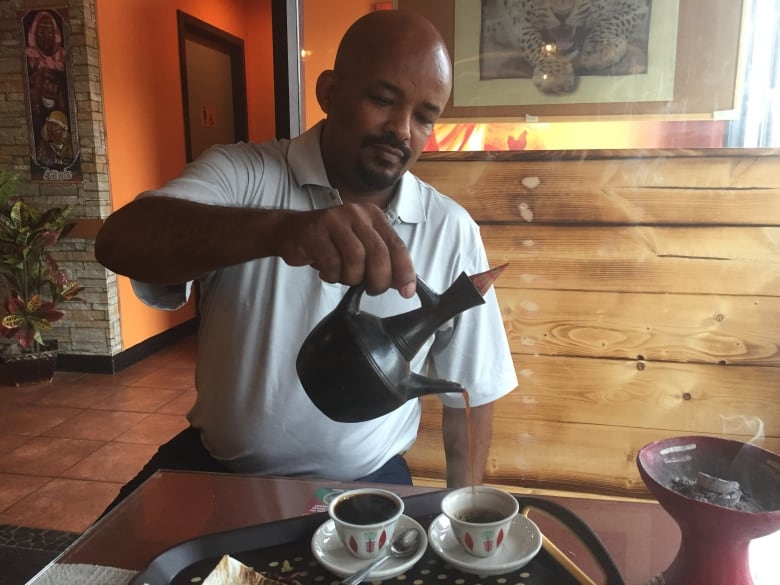Latte, pour-over or double double: no matter how you grind it or brew it, many Canadians start their day with a cup of coffee.
Coffee — specifically caffeine — can be a great way to feel more alert and awake. But what else does this cup of coffee do for our health?
According to experts, it depends.
“In the popular press, one day coffee is good for you, another day it’s bad for you, another day it does nothing,” said Sara Mahdavi, a clinician researcher at the University of Toronto.
But whether a certain level of caffeine has health benefits, is neutral, or harmful depends on how our bodies react to coffee, which happens through a genetic pathway – something many studies don’t take into account. she said.
“For the most part, people don’t look at the genetics of a population that consumes these coffees,” said Mahdavi, who has researched caffeine and genetics.
The dose24:47How does coffee consumption affect my health?
For many of us, coffee is an essential part of our day. So what impact does it have on us, beyond just waking up in the morning? To try to answer this question, we speak to Thomas Merritt, geneticist and professor at Laurentian University in Sudbury. For transcripts of this series, please visit: https://www.cbc.ca/radio/podcastnews/the-dose-transcripts-listen-1.6732281
Thomas Merritt, a geneticist and professor in Laurentian University’s School of Natural Sciences, agrees that a lot of it comes down to our genes.
“There are people who can pound pot after pot with no adverse effects. And there are people, they take a sip of coffee and they get really amped up and overly nervous,” Merritt said. The doseis hosted by Dr. Brian Goldman.
“So there’s a lot of variation in how individuals react to that cup of coffee.”
So how much coffee should we drink?
Mahdavi recommends limiting your caffeine intake to 200 milligrams a day, which she said his research shows is safe for everyone.
How much coffee? According to Health Canada’s caffeine guidelines, an eight-ounce cup of coffee can contain between 118 and 179 milligrams of caffeine, depending on how it’s brewed.
A double shot of espresso — which is more concentrated than regular brewed coffee — contains around 150 milligrams of caffeine.
Health Canada guidelines recommend up to 400 milligrams of caffeine per day for adults who are not pregnant or breastfeeding.
In general, most people can tolerate one to four cups of coffee a day before they start getting upset, Merritt said.
But the key, he says, is to pay attention to how coffee makes you feel.
“Do you feel queasy after a cup of coffee? Well, you should probably cut back or think of something like decaffeinated coffee. What if you feel like you’re waking up and you’re still comfortable with the coffee after a few cups, that’s great,” he said.

How does coffee wake us up?
The caffeine molecules in coffee are very similar to a naturally occurring neurotransmitter in our body called adenosine.
“Adenosine is involved in keeping us sleepy, keeping us asleep,” Merritt said.
Caffeine binds to our adenosine receptors, but since it looks slightly different, it deactivates the sleep pathway and activates a wake pathway instead.
“It breaks that normal sleep cascade and breaks that cycle, and it actually triggers a different cascade that leads to a series of things, one of which wakes us up,” Merritt said.
And it’s not just vigilance. He said drinking coffee can also deliver a dose of dopamine, a chemical neurotransmitter that sends pleasure messages to the brain.
“So drinking a cup of coffee wakes you up, but it has this euphoric effect, in addition to the buzz of a cup of coffee.”
Why our genes are important
Although the mechanics of the caffeine jolt are the same for everyone, experts say the degree to which an individual reacts can vary wildly – due to how quickly or how slowly our bodies metabolize caffeine. .
If you’re a fast caffeine metabolizer, you can tolerate a lot more coffee, whereas if you’re slower to metabolize that caffeine, you’re probably more sensitive to coffee, said Marilyn Cornelis, who studies the genetics of drinking. of coffee.
And these genes often affect how much coffee you drink naturallysaid Cornelis, an associate professor in the department of preventive medicine at Northwestern University’s Feinberg School of Medicine.
“For example, if I have a genetic variant linked to higher caffeine metabolism, I will generally consume more caffeine or dietary coffee,” she said.
“We actually see that genetics alter our behaviors.”
Earlier this year, Mahdavi published a study suggesting that genetic variants that affect our caffeine metabolism have a big impact on whether or not coffee improves our health.
Tung Nguyen knows coffee. And now, he’s bringing his beans and bold brew from his native Vietnam to the Fredericton Multicultural Centre.
For the study, Mahdavi and his co-authors looked at data from more than 1,100 people between the ages of 18 and 45 over a 16-year period.
The participants all had stage 1 hypertension or high blood pressure.
“We were able to demonstrate that, of course, the more coffee individuals who are poor metabolizers consume — specifically more than 300 milligrams of caffeine equivalent per day — there are different health deterrents,” Mahdavi said.
His study measured three markers of kidney health, including hypertension, and found that the group that metabolized coffee more slowly had declining kidney function.
When she looked at the results of fast caffeine metabolizers, they told a different story.
No matter how much coffee they drank, their kidney function stayed the same instead of declining, suggesting that the speed of caffeine metabolism makes a big difference.
“It was really miraculous when you looked at their chart over time,” Mahdavi said. “There was literally no difference between those who drank no coffee, a little coffee, and a lot of coffee, compared to these same three markers of their kidney [health].”
Mahdavi and Cornelis said research shows that about half of the general population metabolizes caffeine more slowly, while the other half does so faster.
So how do you know what type of caffeine metabolizer you are?
There’s a simple genetic test that will tell you, Mahdavi said, although it usually costs hundreds of dollars and isn’t covered by insurance. But you might not have to worry about that.
“Based on my research, we generally consume coffee within our tolerance,” Cornelis said.
This means that if you are a slow metabolizer, you can probably feel how coffee affects you and reduce yourself.

Does coffee do us any good?
For those who metabolize coffee faster, there are definite health benefits, Mahdavi said.
“We saw that the more coffee they consumed, the lower their heart attack rate was,” Mahdavi said of participants in his recent study who were extensive caffeine metabolizers.
More recent research shows that coffee is generally good for us, including reducing the risk of both Type 2 diabetes And Parkinson’s diseasesaid Cornelis.
“Twenty years ago… coffee and caffeine in general had a really bad rap. But with better research they actually showed that at least coffee is actually showing a much more beneficial impact on health in general,” she said.
